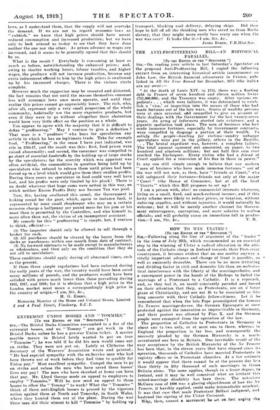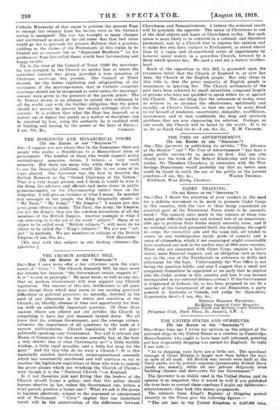HOW TO WIN ULSTER ? [To THE EDITOE OT THE
" SPECTATOR."] Sia,—Following along the line of argument of the " leader " in the issue of July 26th, which recommended as an essential step to the winning of Ulster a radical alteration in the atti- tude of the Catholic clergy in Ireland towards their Protestant countrymen, it becomes evident that on one matter anyway a vitally important advance and change of front is possible, as • well as eminently desirable. There can he no more irritating and dividing factor in civil and domestic life than an ecelesies- tical interference with the liberty of the marriage-choice, and a consequent power in the hands of the Bishops to forbid the marriage of a Protestant to a Catholic. It is a reproach, and, as they feel it, an insult constantly paraded and forced on their attention that they, as Protestants, are on a lower plane of Christianity, and are not fit to be associated its life- long consorts with their Catholic fellow-citizens. Let it be remembered that when the late Pope promulgated the famous Ne Temere marriage-decree, the German Episcopate at once protested against the innovation as impracticable in Germany, and their protest was allowed by Pius X. and the German people were exempted from the operation of the law.
The proportion of Catholics to Protestants in Germany is
about one to two only, or at most one to three, whereas in England the proportion is far less, and consequently the necessity pleaded by the German Hierarchy is a much- accentuated one here in Britain. One inevitable result of the easy acceptance by the British Hierarchy of the Ne- Temere has been that, in the eleven years that have elapsed since its operation, thousands of Catholics have married Protestants in registry offices or in Protestant churches. At a low estimate it would appear that there cannot be at the present day leess than thirty to fifty thousand of such marriages in Great; Britain alone. The same applies, though in a lesier degree, to Ireland, and it may be well conceived what an irritant this mixed-marriage disability has been there. The notorious McCann case of 1908 was a glaring object-lesson of how the Ne Temere, if harshly applied, could make irremediable mischief. It was that ease that made Protestant Belfast indignant, and hastened the signing of the Ulster Covenant. Why, then, cannot a movement be set on foot urging the
Catholic Hierarchy of this realm to petition the present Pope to exempt this country from the decree, even as the German nation is exempted? The war has wrought so many changes and overturned so much of the old order that that fact alone would go far to persuade his present Holiness that a gracious yielding to the claims of the Protestants of this realm to be treated not as outcasts but as " Separated Brethren " (as his predecessor Pope Leo called them) -would bear far-reaching and happy results.
Up to the time of the Council of Trent (no the marriage- tie was accepted by the Church no matter how or where the connubial consent was given, provided a true intention of Christian marriage was present. The Council of Trent decreed, for the better regulating and safeguarding of the sacrament of the marriage-union, that in Catholic countries marriage should not be recognized as valid unless the marriage- consent were given in the presence of the parish priest. The Ne Temere decree is an attempt to extend this ordinance to all the world, and with the further obligation that the priest should not merely be present but should willingly elicit the consent. It is evident that what the Pope has imposed, as a matter not of dogma but purely as a matter of discipline, can be remitted by him, using the authority he is credited with of binding and loosing by the power of the keys of Peter.—



































 Previous page
Previous page